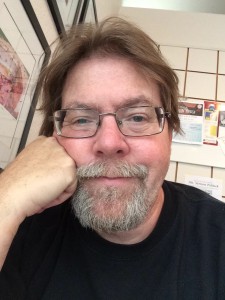 Alex Bledsoe grew up in Tennessee an hour north of Graceland (home of Elvis) and twenty minutes from Nutbush (birthplace of Tina Turner). He’s been a reporter, editor, photographer and door to door vacuum cleaner salesman. He now lives in Wisconsin with his family. His novels include Long Black Curl
Alex Bledsoe grew up in Tennessee an hour north of Graceland (home of Elvis) and twenty minutes from Nutbush (birthplace of Tina Turner). He’s been a reporter, editor, photographer and door to door vacuum cleaner salesman. He now lives in Wisconsin with his family. His novels include Long Black Curl, The Girls with Games of Blood
, and He Drank, and Saw the Spider
.
Is there a literary heroine on whom you imprinted as a child? A first love, a person you wanted to become as an adult, a heroic girl or woman you pretended to be on the playground at recess?
The heroines that made the biggest impression on me as a child were Mina and Lucy from Dracula. I grew up in an isolated Tennessee town in the Seventies, so I didn’t have a lot of access to books, or anyone to suggest things to me. I read the “boy classics,” many of which, like Treasure Island
and Moby Dick
, had no female characters at all. So Dracula
was the first book I read where anything was written from a female character’s point of view (for those who don’t know, it’s an epistolary novel with journal entries from many characters, including both Lucy and Mina).
Can you remember what it was they did or what qualities they had that captured your affections and your imagination so strongly?
It’s terrible to say, but beyond the novelty of reading from a woman’s point of view, it was the reverence in which the male heroes held them that made them feel special to me as well. No one could put a woman on a pedestal like the Victorians, and since I had no historical context for it, I simply accepted it as the way I should look at them, too.
I was also moved by their sisterly support for each other. There are plenty of masculine partnerships in the story, but the bond between Lucy and Mina is just as strong. Also, Lucy has three suitors, and when she picks one of them, the other two are happy for him, not bitter or jealous. By the same token, they display no animosity toward Lucy, nor she toward them. It’s a surprisingly modern and sophisticated arrangement.
Of course, there’s all the symbolism of Lucy becoming a vampire and being dispatched with a phallic stake by essentially all the men in her life, but I missed all that until I reread it much later.
How does these women compare to the female characters in your work? Is she their literary ancestor? Do they rebel against all she stands for? What might your creations owe her?
My Firefly Witch stories are told in first person by the husband of the main character, and he certainly puts his wife on a pedestal; since they were my first recurring characters and I started writing about them when I was in my twenties, it’s not too hard to see where that idea came from, although I hope that I handle it with a bit more psychological realism than Stoker.
Bronwyn Hyatt from The Hum and the Shiver is almost the total opposite, and would completely reject anyone putting her on any sort of pedestal. I can’t say this was a deliberate response to Dracula
, but on a subconscious level, I can’t rule it out.
How do you feel about the word heroine? When I started talking to people about writing these posts, I am specifically looking for female authors’ female influences, whether those women they looked up to were other writers or Anne of Green Gables. Does the word heroine have a purpose that isn’t served by equally well by hero?
I teach teen writing classes at my local library, and most of the participants are young women. I tell them up front that I don’t like the word heroine: a character is either the hero of the story, or they’re not, and their gender is irrelevant. To me, the only reason for the existence of the word “heroine” is to let us know it’s a woman, and I’d like to think we’ve moved beyond needing to know that in order to decide whether to read a particular story. I certainly want my students to think that way, both about what they read and what they write.
About this post: The Heroine Question is my name for a series of short interviews with female writers about their favorite characters and literary influences. Clicking the link will allow you to browse all the other interviews, with awesome people like Marie Brennan, Alma Alexander, and Kelly Robson. Or, if you prefer something more in the way of an actual index, it’s here.



